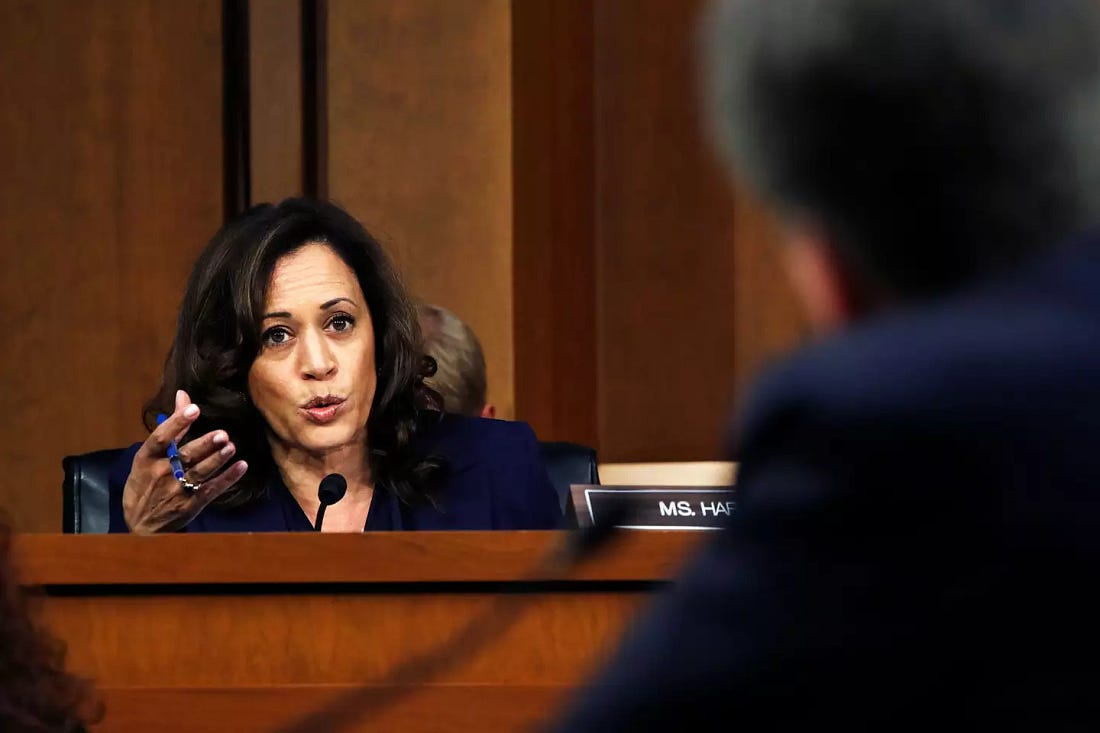
Now why is it important to question whether the president’s nominee to the Supreme Court has talked with anyone at Kasowitz Benson Torres? For two reasons.
One, the firm may end up representing the president in a case before the United States Supreme Court on the question of whether a sitting president can be indicted, among other issues. Two, the nine justices before whom the law firm may end up arguing the president’s case will (most likely) include Brett Kavanaugh, the president’s nominee.
Bottom line: if Kavanaugh had conversations with attorneys at Kasowitz Benson Torres, he might have stumbled into a conflict of interest. Justices are supposed to decide the law blindly. But had he talked to attorneys at Kasowitz Benson Torres, he would have compromised himself. Kavanaugh risked being seen as Trump’s justice.
Before knowing anything else, and after watching the exchange between Kavanaugh and Kamala Harris, anyone with a brain should wonder: What’s going on? She asked: Have you talked with anyone at Kasowitz Benson Torres? He could say yes. He could say no. It doesn’t matter given there are 51 Republican Senators dying to change the court’s balance of power for a generation. Instead, Kavanaugh mumble-bumbles.
That—all by its very lonesome—looks terrible. Again, I don’t know about the substance of Harris’ question any more than anyone else. But she certainly seems to know something. (“Be sure about your answer, sir,” she said!) I’m talking about how it looks. (And it looks so very much worse under the withering gaze of former state prosecutor.) Given what we see, Kavanaugh isn’t taking appearances seriously. It looks like he doesn’t want to answer the question. Reasonably, we should now ask why.
Maybe this is why.
The Post’s Carol Leonnig started asking around: Does he know anyone at the firm? Turns out, yes, he does, a close friend, actually, by the name of Ed McNally.
We-e-ell!

Update:
- Kavanaugh acknowledges close friendship with Kasowitz atty Ed McNally
- White House and Kasowitz firm say McNally neither helped prep Kavaugh nor discussed Mueller probe with him. https://t.co/o41jnTDhoQ
It looks like Kavanaugh did not want to say under oath that he has a “close friendship” with an attorney working for the firm representing the man who’d given him a one-in-a-million chance to rise to the summit of law, because saying that he had a “close friendship” with an attorney working for the firm representing the man who’d given him a one-in-a-million chance to rise to the summit of law would look bad.
OK, OK. But is having a friend at the president’s law firm really a conflict?
You could make that argument, but it must be weighed against something else: Kavanaugh has already declined to say whether he would recuse himself in matters involving the president. He did that to preserve the appearance of judicial independence, which, all things being equal, is the right and proper thing to say.
But all things are not equal, because we know two things: one, that Kavanaugh has a close friend at the law firm, a close friend whose identity he did not divulge under oath; and two, that he would not say whether he talked to anyone at the law firm. If there’s no conflict in having a close friend at the law firm, why not just say so?
Maybe, just maybe, because Kavanaugh is Trump’s justice.
It looks like something else.
It looks like the Kavanaugh story and the Mueller story are no longer unfolding along separate tracks. It looks like the Kavanaugh story and the Mueller story are converging into one story about a president who may have won the presidency by conspiring with an enemy nation, and, by using the power of the presidency, appointed a man to the Supreme Court who may well prevent the president from seeing justice.
Subscribe today!
What do you get? One edition sent to your inbox every day by 2 p.m.
That’s five a week! More than 20 editions a month!
The Editorial Board is for normal people trying to understand politics.
No ads. No sponsors. No “both sides.” Just straight talk straight to you.
Please subscribe today! —John Stoehr
(PS: I need your help. Subscribing helps!)
Here’s what we published last week!
MONDAY
Trump Believes Racism Makes Him Strong. McCain Knew Better
Why won't Trump honor McCain's memory?
TUESDAY
In Death, John McCain Becomes a Potential Wedge Issue
Dishonoring his memory threatens to split Trump's support among veterans.
WEDNESDAY
Schumer Made the Right, Costly, Decision
40 years of Democratic complacency about federal courts is the real problem.
THURSDAY
Don't Overthink Impeachment
The Mueller probe matters, but we shouldn't undervalue what we already know.
FRIDAY
Trump Exposed the Left's Fault Lines
Leftist intellectuals are divided—over Russia, and more.



Yes, fairly transparently the Kavenaugh appointment is part of Trump's defense strategy.
Said strategy involves undermining the rule of law, and Kavanaugh was chosen for his willingness to be complicit.